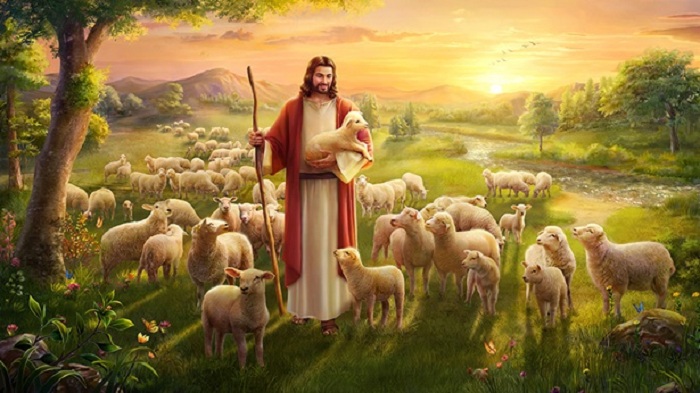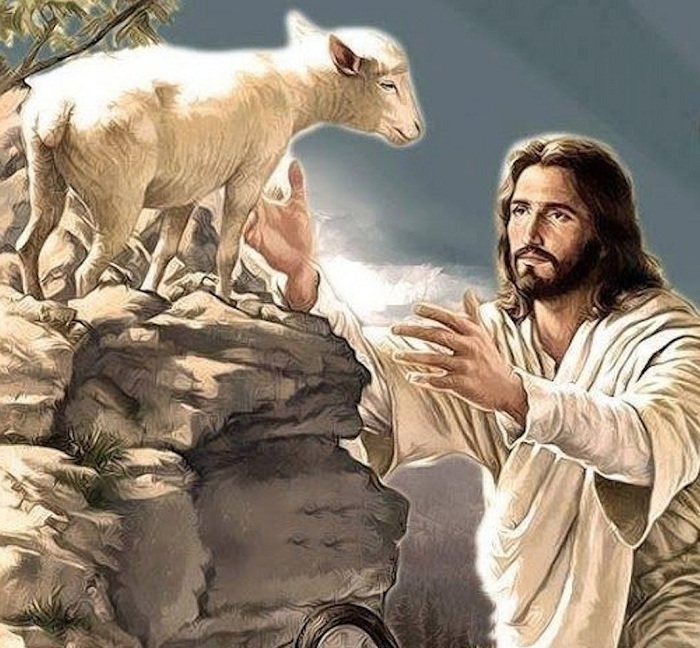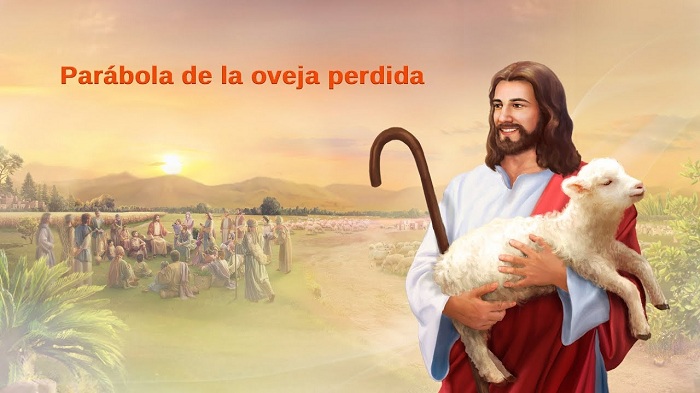In the Holy Scriptures there are various parables, in this article it is developed the parable of the lost sheep, shows us that all of God's children are important to Him, so He will never abandon them.

The parable of the lost sheep
One of the strategies that the Lord used during his ministry to teach the Word of God was parables. One of these is the parable of the lost sheep or the good shepherd. The Lord Jesus Christ tells us:
Luke 15: 3-7
3 Then he told them this parable, saying:
4 What man of you, having a hundred sheep, if he loses one of them, does not leave the ninety-nine in the desert, and go after the one that is lost, until he finds it?
5 And when he finds it, he puts it on his shoulders for joy;
6 and when he gets home, he gathers his friends and neighbors, saying to them: Rejoice with me, because I have found my sheep that was lost.
7 I tell you that in this way there will be more joy in heaven over one sinner who repents than over ninety-nine righteous people who do not need repentance.
As we can see, the parable is about a shepherd who has a hundred sheep in his flock, but one of them goes astray. The shepherd, since he is good, decides to go in search of the one that was lost and leaves the other ninety-nine. It seems that the shepherd has a predilection for that sheep. However, we know that behind every parable there is a teaching. Below is its meaning.
The Bible and the Parable of the Lost Sheep
As we have mentioned before, the Lord Jesus Christ used parables as a resource to teach a message. Now, to contextualize the subject, we consider it appropriate to specify the meaning of the term parable. according to the Dictionary of the Royal Spanish Academy:
Parabola derives from the Greek "parabolé", a term that suggests a comparison. A parable is a short story, in the form of a simple story, real or invented but not fanciful, through which Jesus establishes a comparison: "just as it happens in such a case, so it happens in another."
They are short stories told by Jesus that enclose a moral and religious education, that reveal a spiritual truth in a comparative way.
Starting from the definition, we can begin by affirming that the parable of the lost sheep contains a teaching. Our Lord even explains the reasons that lead him to use parables to teach. Let's read:
Mattheww 7:7-8
And he told them many things in parables...
“When Jesus' disciples asked him why he spoke in parables, he replied: 'To you it has been granted to know the secrets of the kingdom of heaven; but not them. To him who has, more will be given, and he will have an abundance. He who does not have, even the little he has will be taken away. That is why I speak to them in parables: Although they look, they do not see; though they hear, they neither hear nor understand.”
In the words of the Lord, He used this resource to teach those who followed Him from the heart. Sinners and worldlings had not been given the wisdom to understand these teachings. We can read this parable in the Bible (Matthew 18:12-14 and Luke 15:24-27).
The story tells of one sheep, out of a hundred, is lost, and the shepherd (who represents God) leaves the flock to rescue it. Like the parable of the prodigal son, Jesus indicates that God rejoices at the repentance of those who fall away from the faith. Jesus explains that each soul has value to God and is worth bringing back into the fold.
The parable of the lost sheep, we can also find it as the parable of the lost sheep or the parable of the lost sheep, appears in the Gospel of Luke (15: 3-7; Matthew 18: 12-14).
Now, it is a story that presents very evident similarities, they show the same general idea. Certainly, both parts are of the New Covenant. However, they have different frameworks and some of their own characteristics, which show three common elements.
Gospel of Luke (15:3-7)
In the Gospel of Luke the parable of the lost sheep is described as follows:
- A man who has a hundred sheep loses one.
- When he finds out, he leaves the ninety-nine to look for the lost sheep.
- He gets it and feels a strong joy for it, greater joy than for the rest.
It is important to mention that the parable of the lost sheep, in the Gospel of Luke, is called the parable of mercy. When referring to the trilogy of parables, they are also called as the parable of joy. This set of parables includes: the parable of the lost coin, the parable of the prodigal son and the lost sheep.
The group of these three parables define the message and the merciful figure of Our Lord Jesus, to the point that they were even considered "the heart of the third gospel."
Now, in the Gospel of Matthew, the parable is shorter and is part of a norm of life that has the objective of showing the pastors of the Church the spirit with which they must guide and profess their ministry, especially towards the most weak and unprotected.
Message of the parable of the lost sheep
It has generally been instructed that the focus of this parable is the lost or misplaced sheep, which was found by its shepherd who went looking for it, however, this is not the case. In fact, it can be seen that in neither of the two approaches is the word “pastor” indicated. Of course, it is totally intentional because Our Lord did not want this story to be associated with the work carried out by the shepherds; just as it was not the purpose for him to associate with Christians who fell away from his congregation.
The central focus of the story is the joy that man felt for the found sheep; it is simply that the center of the teaching of Jesus in this parable. It shows us a God who rejoices when one of his faithful returns to his arms, that's why he celebrates; in order to celebrate the lost who is found. It should be very clear that according to this parable "for God all men are of his fold, Christians or not." That included the prostitutes, the Pharisees, the publicans and scribes, that is, absolutely everyone.
Knowing the characters
When reading the parable of the lost sheep we can appreciate the intervention of some characters. Below we will develop some of them.
The sheep
The 100 sheep, the number one hundred is not a whim, the Master chose it because it showed an average flock. At that time the flocks of sheep were made up of 20 heads to 200. And the number one hundred is used to show an average man, who is not rich and is not poor. In this way he certified that the vast majority of listeners identified with the story.
The lost sheep
The lost sheep, at that time the shepherds used to give names to the sheep. This sheep was anonymous, since it could be any of us.
It is not special as certain interpreters have proposed. Sheep are usually animals that often go astray, it is one of those that are lost. The loss or misplacement of this sheep represents all those who unconsciously or consciously have distanced themselves from God, from his blessings, from the life that God promised. These people do not know that they are lost, or they do know, but the reality is that they like to be in that condition.
The Shepherd
The man who went looking for her, it is true that it is not mentioned that he is a shepherd, it is obvious that he is. And this is counterproductive, since the pastoral office had been vitiated and was considered with that of the publicans a vile office. However, in the Gospel of John, Jesus confronted a shepherd, to show the religious of that time that God chooses what is despised and vile in the world to embarrass those who believe they are superior. And finally, the man who looks for the lost sheep personifies God Our Lord, the same went out to look for Adam and Eve who after having sinned. It is God who comes looking for us, not the other way around.
friends and neighbors
The friends and neighbors of man, apparently addresses men and women who understand the true meaning of the Kingdom of God; that in the same way they conceive the joy, pleasure of Jesus when a sinful person repents, and he is not judged for being lost, on the contrary they receive him with satisfaction in the fold from which he should never have left.
Themes and meanings of the parable
Now it is imperative that we understand the reality that is hidden in this story. In this case the sheep was not really a sheep, and this shepherd is very different from a shepherd.
The parable of the lost sheep was the epicenter of multiple comments from the time of early Christianity until now. Among the most considered meanings and the characteristics that stand out, we refer to them below.
God's forgiveness and mercy
We can usually consider that this story, especially in the approach of the Gospel of Luke, establishes a passage that has as its main objective the mercy of God. We can read that the man took the sheep in his arms and then put it on his shoulders to carry it.
This symbolizes the great love of God for all of humanity, for the lost, since in the end we are all lost sheep. For our beloved God we will always be people who go astray easily, but in the same way He forgives us and supports us to get out of the different situations that we find ourselves.
This mercy of God is mainly for sinners, and makes a continuous review of the real nature of forgiveness, which marks a very strong teaching where it differentiates the sin from the sinner.
This parable can teach us that God is all mercy and all forgiveness, a God willing to dislodge himself so that the lost can accommodate.
God looks for us
The story presented by the parable under study is not primarily interested in the story of the sheep, which according to symbolizes the sinful man fallen into disgrace.
Rather, he does so by the main character who is the shepherd, who represents God the Father (“In the same way, it is not the will of your heavenly Father that one of these little ones should be lost”) and by extension Jesus Christ himself.
In the role played by the shepherd we can see that he is eager to seek what is lost and shows his joy at finding it. For Jesus, the stories in the parables referred to his strange interest in the lower classes of the Jewish community and non-Jews in Galilee.
The shepherd does not show feelings of anger, when he perceives the loss of the sheep, simply the concern to find it. The sorrow and the strong pain that he felt force him to carry out a laborious search.
Although in the first part of the story of the parable reference is made to the shepherd's love for the lost, the central core of the story is the joy of finding what is lost.
In the Bible the parables that are dedicated to mercy, Jesus shows that the nature of God is that of a Father who never gives up. Persist until the sin has been undone and even more the rejection overcome with mercy.
In the parables outlined in the Bible, known as those of mercy or joy, God is always presented happy, especially when he forgives. Without a doubt, in them we can find the center of the Gospel and of our faith, since mercy is presented as the driving force that overcomes everything, that always fills the heart with love and that also grants forgiveness.
This parable also teaches us that the most judicious in faith are the ones who should go out in search of the immature. In other words, the universal promise of the believer is practiced when we leave our environment to look for the invisible before society, the homeless, the poor, those unable to have access to the good life.
Now, those of us who have more fortune must leave it to share with those most in need, the blessings that God has inherited us, and that not only includes a "God bless you", but also share our money, our food, our clothes with the destitute; for this parable does not point to the other sheep, those that are in the world.
God finds us
When the sheep grazed without realizing it, he moved away from the rest, of course now he does not see the flock or the shepherd. He is unprotected in the mountains where there is danger and night is coming.
Suddenly, he hears a voice that is familiar to him, it was the voice of the shepherd, he runs towards her, girds her with his clothes and takes her back home.
On repeated occasions, Jehovah compares himself with a shepherd. His message tells us:
Ezekiel 34:11, 12
“Surely I will seek out my sheep and take care of them
I will take care of my sheep
If we ask ourselves the question: Who are Jehovah's sheep? Without a doubt, they are the people who follow him, love him and pay him devotion.
The Bible says:
Psalm 95:6, 7
“Come in, let us worship and bow down; let us kneel before Jehovah our Maker. For he is our God, and we are the people of his pasture and the sheep [under his care].”
Many times those who worship God want to go after their Shepherd, like the sheep, but they do not necessarily reach him. Sometimes those of us who serve the Lord are like lost, lost or misguided sheep (Ezekiel 34:12; Matthew 15:24; 1 Peter 2:25).
Today, does Jesus take care of us like a shepherd?
Of course! The Lord assures us in his Word that we will lack nothing (Psalms 23) This means that God provides us with all things: health, protection, care, food, provisions and all those Biblical promises. In a spiritual sense, as he assures us in:
Ezequiel 34: 14
14 I will feed them in good pastures, and their sheepfold will be on the high mountains of Israel; there they will sleep in a good fold, and in succulent pastures they will be grazed on the mountains of Israel.
Certainly, it always provides us with a lot of diversity of spiritual food, but above all, at the right time.
He gives us protection and help, the Lord promises:
Ezequiel 34: 16
"To the dispersed I will bring back, and to the broken one I will bandage and to the mourner I will strengthen".
Jehovah provides encouragement and strength to those who are weak or burdened by circumstances. If someone harms the sheep He heals his wounds, even if he is a brother to congregate. In such a way that he helps to direct losses and those with negative emotions.
If we get lost, he looks for us.
“I will deliver them out of all the places to which they have been scattered,” says Jehovah. And he further promises: “I will seek the lost” (Ezekiel 34:12, 16).
For God, any lost sheep is not a hopeless case, He realizes when one is lost, in such a way that he searches for it until he finds it and rejoices (Matthew 18:12-14).
That is why he calls his true servants "my sheep, the sheep of my grazing" Ezequiel 34: 31. And believe it you are one of those sheep.
Make us again what we were before
Jehovah invites you to look for it, because he wants you to be happy. He has promised that he will fill his sheep with many blessings Ezequiel 34: 26. And you have already witnessed it.
It is important for you to remember the feeling you had when you met Jehovah, for example, when you learned God's name and what he intends to do with mankind.
God's servants of old prayed:
“Make us return to you […], and we will return; make us be again what we were before” (Lamentations 5:21).
And the Lord answered them, and his people returned to serve him with joy (Nehemiah 8:17). He will do the same to you.
And certainly, those who decide to return to the Lord must face great challenges.
God choose us
In Paul's affirmation, in section 1 of his writing to the Ephesians, he says that the faithful have been glorified with all spiritual blessings in the heavenly realms, in Christ. Paul goes on to say that the promises God has given us are according to God's perpetual plan.
The spiritual blessing that the Lord gave us was written before the foundation of the world and made according to the eternal purpose of God, it was not by whim or chance. The biblical doctrine of God's sovereign election is one of the most abused and attacked in the Holy Scriptures. They can't stand the thought of Heavenly Father exercising his privilege of being God.
The Bible makes it very clear that our God is totally sovereign, and that he independently chose one group of people to save, and left others to their just doom, and this happened just before the foundation of the world.
This doctrine in the life of the Christian is of vital importance, so let us observe what Paul exposes in these verses:
Ephesians 1: 3 – 6
3 Blessed be the God and Father of our Lord Jesus Christ, who has blessed us with every spiritual blessing in heavenly places in Christ,
4 as he chose us in him before the foundation of the world, that we should be holy and blameless before him,
5 in love having predestined us to be adopted his children through Jesus Christ, according to the pure affection of his will,
6 to the praise of the glory of his grace, with which he has made us accepted in the Beloved,
As we study these verses there are specifically two words to note. In the first instance, vers. 4 says that God chose us, and in verse 5 that he predestined us. The words are very similar in meaning. “Choose” means “select”. This word is used in Luke 6:13 to talk about Christ's choice of the twelve apostles.
The Lord chose them from the crowd that always followed Him to be His apostles. The same applies here. Our Father selected us for salvation. As it says in:
John. 15:16:
"You did not choose me, but I chose you."
The second word predestination: "is the translation of the Greek word"proorizo”, word composed of “pros” meaning “in advance”, and “orizo” where our word “horizon” comes from. In that sense, it means drawing a limit beforehand. Jehovah as a sovereign drew a line, and destined them in advance so that some would go to heaven.
Paul establishes the foundation of choice, "as he chose us in him", at the moment that the Lord made us part of His sovereign plan He knew that we did not deserve it. However he canceled our debt beforehand. Without the second Person of the Trinity we would never have participated in God's saving plan.
Then Paul speaks of the moment of election: We were chosen “since before the foundation of the world”, God sovereignly included us in His plan of redemption. And this was done in eternity, before the beginning of time.
In that order, we continue with the purpose of election, Paul says that God has chosen us "to be holy and blameless before Him." The Lord did not see something good in us, he simply observed us in sin and from there he selected us to be saints as Ephesians 2: 1-3 says, holiness is not the cause, it is the fruit of being chosen.
That divine purpose in the election must have repercussions in our lives as Christians. We must positively have the ambition to be holy, to conform more and more to the holy character of God. Negatively we must have the ambition to be blameless, blameless. Protected by the grace of God we must separate ourselves from all appearance of evil, Paul says in 1Thess. 5:22. That is why we were chosen.
The work of glorification begins at the moment of conversion, our hearts are purified and free of sin and will continue in our lives as we practice the grace that God has inherited us.
Now, in verse 5, Paul indicates that we were chosen consecrated in love, “to be adopted as his sons through Jesus Christ”.
At present, when we refer to the term of adoption, children come to mind, but in those days adults used to be adopted. For example, if a wealthy man had no one to leave his fortune to, he found a worthy person to leave it to, and adopted him as his son. From that very moment, the son began to enjoy his inheritance, and that is the idea that Paul presents when speaking of adoption.
rejoicing of god
Certainly when we ask ourselves if God rejoices in his children? Yes, he does. Now the question shows two elements: in the first instance, what distinguishes God in us that leads him to rejoice? And secondly, why does he indicate that he rejoices in us? When I say "God," I mean all that God means to us in Christ. I refer to the Christian and Triune God.
Now, let us pay attention to various verses that give us reference to the joy of God in his people and their praise:
Zephaniah 3:17
“The Lord is in your midst, mighty, he will save; will rejoice over you with joy. "
Salmo 147: 11
"The Lord delights in those who fear him, and in those who hope in his mercy. "
Now, we can say that in answer to the first question, what God sees essentially in us that leads him to rejoice is that we are the ones who live from the joy of being in his presence. And obviously God must approve what is correcto. Therefore, He rejoices in the way we feel, think, and do His perfect will. Not because it is imposed, but because of free will we have decided to follow Him. A true Christian knows that obeying God is synonymous with blessing.
"Righteousness" means think, feel and act in a way that expresses, in true proportion, the value of what is most valuable. It is to really observe the rejoicing and assiduously manifest in actions infinitely the value of Our God. In this way, the right thing is done when we understand the truth of the value of God for what it is, and feel it equal to the universal hegemony of it, and proceeding in a way that says the supreme value of God.
Filipenses 4: 4
"Rejoice in the Lord always. Again I say: Rejoice!
Romans 5: 2
"Through whom also we have access by faith into this grace in which we stand, and we rejoice in the hope of the glory of God."
The Lord appreciates actions that value Him and rejoices to see that we rejoice in Him. Hence when we say that God rejoices in the way we think, feel and do what is appropriate, we mean that He rejoices in how we perceive, rejoice and expose His own supreme value. The right reason to get excited about the Lord rejoicing in our joy in Him is because gives confirmation that our joy in Him is true'.
By fixing our gaze solidly on Him and making our joy in His beauty greater, then there is a destructive way of responding to God's approval of us. Therefore, if we exclusively use joy in order to obtain praise, we are doing it very wrong, since we would not be rejoicing in God. Also, the illustration that God rejoices in us is very dangerous, because we are fallen, and the primary reason for the fallen nature is not sex, but rather self-exaltation.
The sinful nature that we have loves to be worshiped for what we exist and what we do. So the correction for this is not that God becomes a praiser, the proper thing is that we hear the praises as confirmation that our joy really is in Him. Definitely the praise of God for our joy in Him is meant to help us stay rejoicing. in Him, and without any distraction.
Salmo 43: 4
I will enter the altar of God, God of my joy and of my joy. "
Salmo 70: 4
"rejoice and rejoice in you all who seek you, and let those who love your salvation always say: Great be God.”
It is true that we enjoy ourselves in the fulfillment of God towards us, but we do not do it in the way that a carnal instinct would. In that sense, flattery of him cannot be allowed to be a distraction from the reason he praises us, namely, our delight in him.
Even his compassionate consent to our imperfect joy in him makes him more beautiful in himself. When you hear the phrases: "Well done, good and loyal servant," say, how great and merciful is our God. Unquestionably the Lord sees his heirs through the justice that has been imposed on Christ, so there is a relationship between what is expressed here and it.
We can translate this into:
- First of itself, it considers us similar to Christ; that is to say, like his children, since we have been adopted.
- Second: He can see our transformation to what we already are in Christ. From the point of view of imputation we have secured the invulnerable right to the side of the Lord. In addition to guaranteeing God's joy in our imperfect rejoicing in Him. Although God considers us perfect and righteous in Christ, He has the ability to observe true sin, as well as the product of the Spirit in our existence.
Therefore, the Lord is enthusiastic in us to lesser or greater levels, and we know it because for Him we are perfectly upright as He says (Romans 4:4-6) and disciplines us in relation to the sin that we can commit (1 Corinthians 11: 32). Consequently, the joy of Our beloved God, for the joy that we show for Him will vary in accordance with the attachments that exist in the heart, however, it will be possible because the Lord attributes to us the perfect justice of Christ.
Caring for the other 99 sheep
This story instructs us that Our Heavenly Father loves both the lost and all those who remain with Him. In the stories made by Matthew and Luke they have been criticized because they mention that the 99 sheep were left helpless in the desert or the mountain may be the case, while the shepherd was looking for the lost one.
Definitely, it was not like that, everyone who is a good shepherd and, moreover, experienced at that time, took their respective forecasts. He had field pens, either in the mountains or the desert, where he kept his sheep precisely for cases like this.
Now, those pens were made with materials that the place offered them and they were made at the right time, they were not done before or after. While it is true that these acts were not recorded in the Gospels of Luke and Matthew, it was because they were not necessary.
It is important to point out that if that shepherd had 100 heads of sheep, it is because he always took the corresponding forecasts. He showed that he was a good shepherd since he watched over his financial income, in this case the sheep were his sustenance.
Hence, this shepherd, although uneducated, according to tradition, would not go on a crazy search for a sheep, and would thus neglect 99 financial income to the fate of the field. This pastor was neither foolish nor wasteful; if he had been he would never have had 100 sheep.
Teaching Parable of the Lost Sheep
The Parable of the lost sheep leaves a great teaching about the great love that Jesus Our Lord has for us. He is always willing to go to meet us, in no way does he leave us alone, he is a friendly and close Father who is willing to leave everything to go looking for us as a great companion along the way.
Jesus, through the Parable of the Lost Sheep, makes us be constantly attentive to help the most needy and above all to forgive.
The parable of the lost sheep is still valid
Definitely today it can be said that it also serves as a great learning for the Christian faithful and for the rest of the people. The heart of Jesus and that of the Father are greatly merciful. For them even the last of us is extremely important.
So much so, that when one of us gets lost we try to catch bad practices or we deviate, they take care of us in such a way as if we were only children. Because, certainly, each of us is unique to them. They take care, without preventing us from making use of our free will, if we intend to remain in those bad habits or deviations or even make them progress we can do it.
When any of us repent and decide to return home after being lost, it happens like in this parable, in which the shepherd carries the sheep on his shoulders, returns home happy and celebrates with his friends.
We can say that in our case it is the same, far from applying punishments and reproaches, we find ourselves with unconditional forgiveness, a big hug and a party in Heaven in our honor. Because having recovered what was lost is a commemoration that it deserves. This does not mean that because we know that God loves us and forgives us, we are free to sin. Thinking like this means that we are not sorry. Truly what it is about is disciplining our flesh and fighting to subdue it.
This story is enormously encouraging for all those who, far from feeling fair, rather feel full of mistakes and knowing. We have already stumbled a thousand times over the same stones: again with consumption, again with neglect of others, in short, with that self-centeredness of first me, then me, and then me that is so difficult to get rid of.
Being certain that we can ask for forgiveness knowing that we will be received with open arms, without reproaches and without rancor is a real privilege. In correspondence with those who insult us and then approach repentant, our behavior should be equivalent to that of Jesus and the Father, that is, generous, sensitive and merciful and closely with anyone who needs that mercy.
The behavior of the men they have here on earth is far from that greatness. As much as people come back repentant, what we want is for them to pay for what they did. Our heart is often as hard as a stone.
If indulgence had abounded among those who inhabited the earth 21 centuries ago and among those of us who live on earth today, it would not have been necessary for Jesus to become a man and come into the world to teach us that love is the only thing that gives meaning to life. lifetime.
The parable of the lost sheep summary
The title given was not the most appropriate, simply because it was not given by Jesus. It was given by the copyists of that time who were in charge of putting commas, points, and separating paragraphs from the Holy Scriptures. But the main theme is about the joy of our Heavenly Father when one of his children returns to fellowship with Him.
Now, it would be inappropriate to take this parable to punish spiritual leaders who do not go looking for their lost sheep (because that is not the main idea of this biblical account). Furthermore, it would be wrong to cling to this parable to prove that we distance ourselves more and more from our God, because in the end we are aware that He will forgive us when we meet. However, there are faithful who like to get out of the congregational world, and then from "the world" make claims to their pastors who did not go looking for them, this message is not for you.
While it is true that God is all mercy, forgiveness, he is still very firm. Obviously his patience is great but it also has a limit. Limit that has been imposed for love of us. Well then, let us give thanks to Our Heavenly Father for the life that rejoices when a lost person returns to the track, which is nothing more than the life that He dreamed for everyone.
From
The origin of this parable is not yet defined, there are a variety of criteria on which of the two versions is closer to the initial version.
Different recognized biblical scholars such as: Rudolf Bultmann and Joseph A. Fitzmyer, indicated that the Matthew version is closer to the original. On the contrary, Joachim Jeremías and Josef Schmid stated that the text outlined in the Gospel of Luke is more similar.
On the other hand, there is the opinion of the biblicist Claude Montefiore who commented: the original history of the parable could be preserved in a shared way: some points in the Gospel of Luke and others in Matthew could protect the original material precisely.
Who is the parable addressed to in Luke and Matthew?
We have that in the Gospel of Luke, the story is directed at the enemies and critics of Jesus. These, Pharisee rabbis, established a principle of not interacting with people considered sinners because of their condition or job: "Man should not interact with the wicked or to teach him the Law."
In this sense, Our Lord makes the parable of the lost sheep to teach the scribes and Pharisees a lesson in the face of unworthy gossip that always questioned Jesus' conduct, for receiving sinners and sitting them at his table.
On the contrary, we can show that in the Gospel of Matthew the parable presents us with a different destiny, since Jesus does not focus it on the Pharisees opposed to him, but on his own disciples.
It should be noted that at that time "the disciples" meant the leaders of the Christian community.
Definitely, both narratives have a point to highlight in common, neither of them makes explicit reference to the term "good shepherd" or "shepherd".
On the other hand, there are characteristics with well-marked differences in the two approaches to the parable. It is noted that in Matthew, the shepherd leaves his sheep on the mountain, unlike Luke who does so in the desert.
In the version of the Gospel of Luke it shows the owner carrying the lost sheep on his shoulders. In the Gospel of Matthew there is no record of that point.
Where is this parabola found?
Matthew 18, 12-14
12 What do you think? If a man has a hundred sheep, and one of them goes astray, does he not leave the ninety-nine and go through the mountains to look for the one that has gone astray?
13 And if it happens that he finds it, I tell you the truth, he rejoices more over it than over the ninety-nine that did not go astray.
14 Thus, it is not the will of your Father who is in heaven, that one of these little ones should perish.
It is important to note that this parable is contained in very old papyri and codices. Among the New Testament papyri the oldest is Papyrus 75 (dated from 175-225), and here we can see the Lucan version of this story. Inclusively, both versions, the one reviewed by Matthew and Luke respectively, are contained in the four great uncial codices of the Bible in Greek.
Now, the two canonical versions of the parable are shown:
Luke 15, 1-7
1 All the tax collectors and sinners came to him (Jesus) to hear him, 2 and the Pharisees and the scribes murmured, saying, "This man welcomes sinners and eats with them." 3 Then he told them this parable. 4 “Which of you who has a hundred sheep, if he loses one of them, does he not leave the ninety-nine in the wilderness, and go after the one he lost until he finds it? 5 And when he finds her, he gladly puts her on her shoulders; 6 and coming home, he summons his friends and neighbors, and says to them, “Rejoice with me, for I have found my lost sheep.” 7 I tell you that, in the same way, there will be more joy in heaven for a single sinner who converts than for ninety-nine righteous who have no need of conversion.
Why two versions of the same parable?
These two versions complement each other and thus allow readers to have a broader view of what happened. In reality it was not that Mateo and Lucas heard a different story, rather each one had their own interpretation of the facts, as usually happens to human beings.
According to Bible specialists, the narration of the Parable in Matthew is the first version to be written. After a few years, the historian Luke took his time to write his own story, including certain elements that were not captured in Matthew's parable.
The image of the shepherd and the sheep in the time of Jesus
In the time of Jesus of Nazareth, shepherds were held in a bad light. He featured them on many job listings that were considered despicable. To such an extent that it is not convenient for a father to teach his children because they are "thieves' trades."
In the writings of the rabbinical literature in various ways it contained very unfavorable opinions about those who performed that office. However, throughout the Holy Scriptures David, Moses and even Yahweh himself were presented as shepherds.
In fact, shepherds were equated with publicans and tax collectors. It was said:
"It is difficult for shepherds, tax collectors and publicans to do penance",
In the Gospel of Luke, as already mentioned above, Jesus is heavily criticized by the scribes and Pharisees for the reason of welcoming the publicans. In response to this harsh criticism, he delivers a parable in which the merciful interpreter is a shepherd, a harshly despised figure.
For this reason, this group has been called "Gospel of the marginalized", since its main objective is to demonstrate how close it is to God and of course his great mercy for those who exist fatigued by the rejection of other people. .
Jesus taught through parables
Parables represented for that time a very common cultural way of communicating. Unlike Jesus, the religious leaders resorted to academic language and quoted each other. While the Lord did it in the form of storytelling, already familiar at that time. Thus managing to communicate very deep and spiritual truths that allowed him to connect with his audience in a very particular way and religious leaders could not do it.
The purpose of parables
Jesus used parables as a means to show intense, deep and divine truths, but his main purpose was spiritual, since he had the ability to show information to people who were determined to listen.
Through these stories, people could easily remember the characters and symbolism that had great meaning.
So, a parable represents a blessing for all those who have ears ready to hear, however, for those with ears and hearts that are dull it can mean a declaration of judgment.
Characteristics of parabolas
To continue with the development of the theme it is important to mention the characteristics:
- They always refer to action and not to the field of ideas, it is inferred that the parables were made so that people would be motivated to act rather than think.
- They were directed at people who disagreed with Jesus and represented a form of dialogue that primarily avoids direct challenge. It was a resource that could be used not only pedagogically but also relationally. Uncomfortable but “chewable” truths were told.
- They were extremely persuasive since their foundation was based on experiences that were easy to understand for everyone, they were accessible and very confrontational.
And to finish reading I leave you this complementary material.








